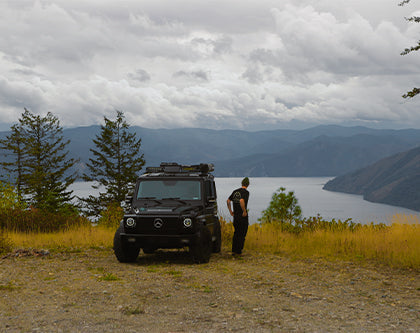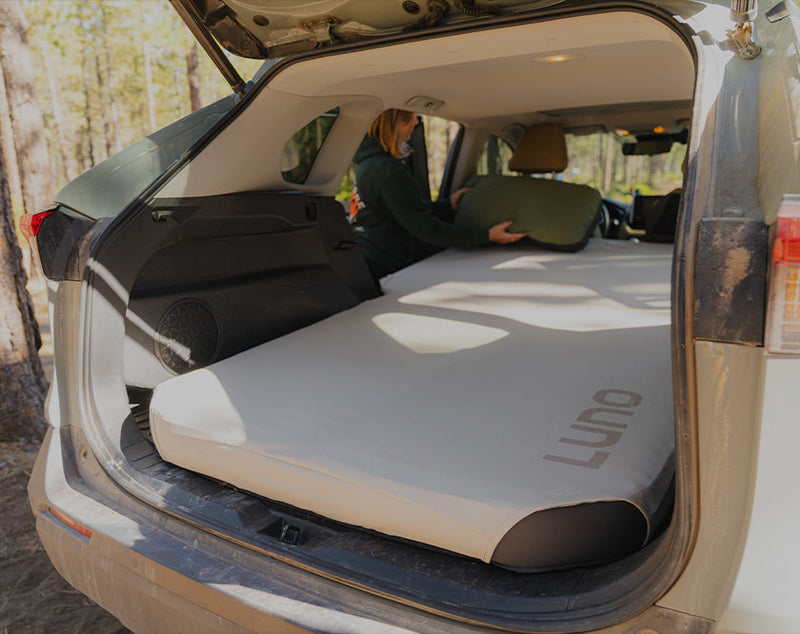
12 International Road Trip Tips
Road tripping is a lot like math (except, you know, more fun). When presented with problems, mathematicians use logic to find solutions, and road trippers are no different. But if domestic road trips are basic arithmetic, then international road trips can quickly turn into calculus.
Variables we consider simple at home, like car insurance or finding safe campsites, can feel exponentially more complex abroad. That said, we’re not here to dissuade you from international road trips—we just want you to study up first. So whether you’re cruising into Canada, dipping into Mexico, or venturing further afield, read up on these international road trip tips–and crush any calculus problems that arise on your travels.
1. Research, Research, Research
If we could only give you one piece of advice before an international road trip, it’s this: do your research. What’s the weather like during your target window? Are the roads passable in winter? Is the zone considered safe? Any scams or common dangers to be aware of? Do you need to book a ferry to complete your route? What are the ferry schedules? Will your car insurance cover you, or do you need an additional policy?
Write an exhaustive list of questions, and then google your heart out. Find overlanders or travel bloggers who have completed similar routes and take notes. Join forums, read threads, and ask questions if you can’t answer them through research.
Pro tip: Attend overland events to meet like-minded road trippers with firsthand experience.
2. Preventative Maintenance is Key
We can’t stress the importance of preventative maintenance enough. Make sure your rig is in tip-top shape before you embark on an international road trip to avoid mid-trip mechanicals and migraines. Ask your mechanic what they’d fix or replace before taking off on a long adventure if your rig was their vehicle.
3. Preventative Maintenance for Your Body (Vaccines and More)
Again, do your research ahead of your trip–what vaccines are required or suggested ahead of your adventure? Do you need proof of COVID vaccines to enter the country? Is an antimalarial medication recommended? And don’t forget about your own prescriptions: get a large enough quantity to cover yourself for the entirety of your trip. If your itinerary is open-ended, research the availability and cost of your day-to-day medications.

4. Be Prepared for Mechanical Failures
Even after pampering your vehicle with preventative care at home, expect mechanical failures on the road. All international road trippers should have a basic understanding of common failures and fixes—namely, how to change a flat tire, check and refill fluids, etc. Make sure you have an off-road-ready spare, too, not a puny donut.
Do research on your vehicle and your road trip destination—will local mechanics be used to working on this type of vehicle? Will they have ready access to parts? If not, you may want to bring parts with you. For instance, if you drive a common vehicle, like a Chevy or a Ford, through South America, lugging spare parts isn’t necessary. However, if you’re driving a specialty vehicle—looking at you, Sprinters—you may want to bring certain spare parts with you, as they can be difficult to source abroad.
5. Dude, Where’s My Car Insurance?
For obvious reasons, it’s mission-critical that your car is properly insured prior to international road trips. Call your insurance agency and double-check ahead of your trip: are you covered? If not, can they write a new policy for the duration of your trip? No? You’ll have to find third-party insurance.
6. Phone Service and Satellite Communications
No one wants to be hit with that surprise bill from the phone company for three weeks of roaming charges. Check with your service provider to see if you’ll have service throughout your travels—and don’t forget to ask what texts, calls, and data will cost.

Satellite communicators like the Garmin InReach, Bivy Stick, or SPOT are must-haves for any international road tripper, especially when exploring remote zones and mountainous terrain. These devices allow you to send check-in messages, GPS coordinates, and emergency SOS signals to loved ones and authorities back home—even if you’re in the middle of nowhere.
7. International Driving Permits
Secure an International Driving Permit (IDP) for $20 at a AAA before you hit the road. This globally recognized document certifies that you have a current US driver’s license and translates your personal information into ten common languages. If you get pulled over while abroad, always hand over the IDP instead of your driver’s license or passport.

8. Bribe Money
It’s no secret that police in developing nations often target foreigners over bogus traffic violations. Sometimes, all police are looking for is a small bribe and they’ll let you pass. We like to keep a decoy wallet near the driver’s seat with approximately $40 in it—you can pull out the wallet, show the $40, and say, “This is all I have.” If you pull out a wallet with hundreds of dollars in it, you can bet the bribe will be more than $40.
9. Travel During the Day and Maintain a Low Profile at Night
When traveling abroad, it’s always safest to maintain a low profile. You don’t want to draw the attention of law enforcement—or worse. We recommend you fly below the radar, especially in high-risk areas. That means drinking responsibly, respecting locals, keeping your wits about you, not flaunting wealth, etc. In more dangerous locales, you’ll want to exclusively travel during the day and avoid nightlife altogether. In these instances, plot routes ahead of time and leave early in the morning to ensure you make it to a safe zone by nightfall.
10. Pay for Camping for Peace of Mind
At home, we use apps like iOverlander to find free camping. But on international road trips, depending on the perceived risk of the location, we’ll happily pay for a campground that’s run by locals and has a night watchman. Even if you’re road-tripping on a budget, you’ll find that paying for a campground is well worth the peace of mind. In some instances, you may feel inclined to splurge on a hotel room for the night, and that’s okay, too. Again, safety first.
Pro tip: When you do camp in your vehicle, always use our Car Window Screens and our new Car Privacy Curtain to shield yourself and your valuables from view.
11. Drive Like a Local
Before you start speeding through Canada or Mexico, remember, they use kilometers per hour, not miles per hour. All jokes aside, research road regulations ahead of your trip and pay close attention to local driver behavior. In Mexico, for instance, if you slow down on the highway and flash your left turn signal, local drivers will think you’re indicating that they should pass you on the inside. If you turn left after flashing your blinker, this easily avoidable mistake could cause a fatal accident. Instead, drivers in Mexico pull over to the far right of the highway, wait for a gap in traffic, then make the left turn. It’s a somewhat counter-intuitive process, but it’s a perfect example of how driving norms can shift once you’re abroad.
12. Clearing Customs
This goes without saying, but be pleasant and respectful to customs agents. Also, get rid of fruits and vegetables before you return to the United States to avoid a lengthy search of your vehicle.
Of course, this list of international road trip tips is far from exhaustive. Instead, it’s a launch point for you and your travel companions to think critically about your upcoming adventures. Hopefully, these tips will help you avoid common pitfalls and react intelligently when things go south. Study up, keep a level head, and you’ll be fine—it’s just math, after all.











